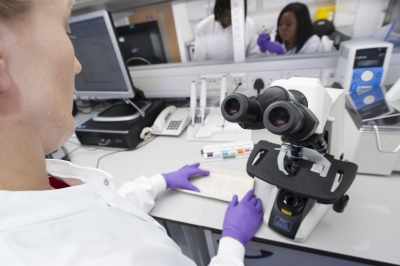15 February 2024
 Three clinical trials taking place at Royal Brompton and Harefield hospitals have each become the first in the UK or internationally to recruit patients, highlighting the very favourable research environment at the hospitals.
Three clinical trials taking place at Royal Brompton and Harefield hospitals have each become the first in the UK or internationally to recruit patients, highlighting the very favourable research environment at the hospitals.
Recruiting participants to clinical trials can be notoriously difficult for a number of reasons, including strict eligibility criteria and patient and public misconceptions about clinical trials. However, three clinical drug trials in aspergillosis, idiopathic pulmonary fibrosis and atrial fibrillation have each managed to be the first to recruit patients.
This is in no large part thanks to Royal Brompton and Harefield hospitals status as a specialist tertiary referral centre, which has allowed researchers unrivalled opportunities to focus on the rarer and more complex aspects of cardiac and respiratory medicine. In many cases, these patient populations are the largest in the UK or internationally.
Dr Nana Theodorou, associate director for research further expanded on the factors that make Royal Brompton and Harefield hospitals the perfect place for research.
She said: “The unique combination of large, rare patient populations, and internationally renowned clinicians and opinion leaders has allowed for a culture and environment that prioritises innovation and research.
“The success of clinical trials is heavily reliant on the ability to enrol a diverse and representative group of participants. Our patients are offered the opportunity to access the latest treatments through a robust multidisciplinary approach to identify and enrol patients into our varied portfolio of research studies.
“We are committed to driving a research culture which advances knowledge and treatments for our patients and maintaining a competitive edge in the global research landscape. “
Read more about the individual clinical trials below.
Investigational antifungal agent
Led by Professor Anna Reed, consultant in respiratory and transplant medicine, this trial aims to determine whether a new investigational drug called opelconazole, developed by Pulmocide, can help treat pulmonary fungal disease.
Specifically, the study will look at patients with invasive pulmonary aspergillosis (IPA), a lung infection caused by a common fungus found in the air (aspergillus), who are not responding well to their current antifungal therapy.
Patients will be given the investigational drug opelconazole, alongside their usual antifungal therapy.
The clinical trial is currently taking place at 67 sites out of 94 planned worldwide, and the first UK patient was recruited at Harefield Hospital.
New drug candidate for Idiopathic Pulmonary Fibrosis
Led by Professor Philip Molyneaux, consultant respiratory physician, this trial is also looking at a new development drug called LTI-03 for people with idiopathic pulmonary fibrosis, a condition in which the lungs become scarred and breathing becomes increasingly difficult.
The drug was developed by Lung Therapeutics and is self-administered with an inhaler. The trial will compare the drug to a placebo (a dummy treatment) and determine whether potential side effects can be handled in patients with idiopathic pulmonary fibrosis, how much of the drug is absorbed by and cleared from the body, and the body’s biological response to the drug.
Patricia Duarte, lead research nurse on the trial, explained the importance of patient volunteers.
“Patients who volunteer for clinical trials play a crucial role in moving medicine forward. Their participation helps find better treatments and improves healthcare for everyone. Their contribution really matters, and we’d like to thank them for being part of progress.”
The clinical trial is taking place across 10 sites worldwide and the first patient recruited globally was at Royal Brompton Hospital.
Alternative drug for stroke prevention
Dr John Foran, consultant cardiologist, is leading on a clinical trial to determine the safety and effectiveness of an experimental drug called abelacimab in patients with atrial fibrillation (AF).
AF is a heart condition that causes an irregular and often abnormally fast heart rate, increasing an individual’s risk of stroke. Standard care for people with AF involves the use of drug thinning medications, known as anticoagulants, to reduce the risk of stroke.
However, some individuals are unable to tolerate regular anticoagulants as they increase the risk of bleeding.
Abelacimab is an experimental blood thinner being developed by Anthos Therapeutics which works in a different way to the usual standard care anticoagulants. Because of this different action, it is thought this experimental drug might be able to prevent strokes without increasing the risk of serious bleeding.
The clinical trial will compare the drug to a placebo in patients with AF that are not suitable to receive standard anticoagulants because of the risk of bleeding.
The trial is taking place in approximately 21 countries across the world, and the first UK patient was recruited at Royal Brompton Hospital (14 UK sites).
Read more research stories or sign up to our research newsletter.
